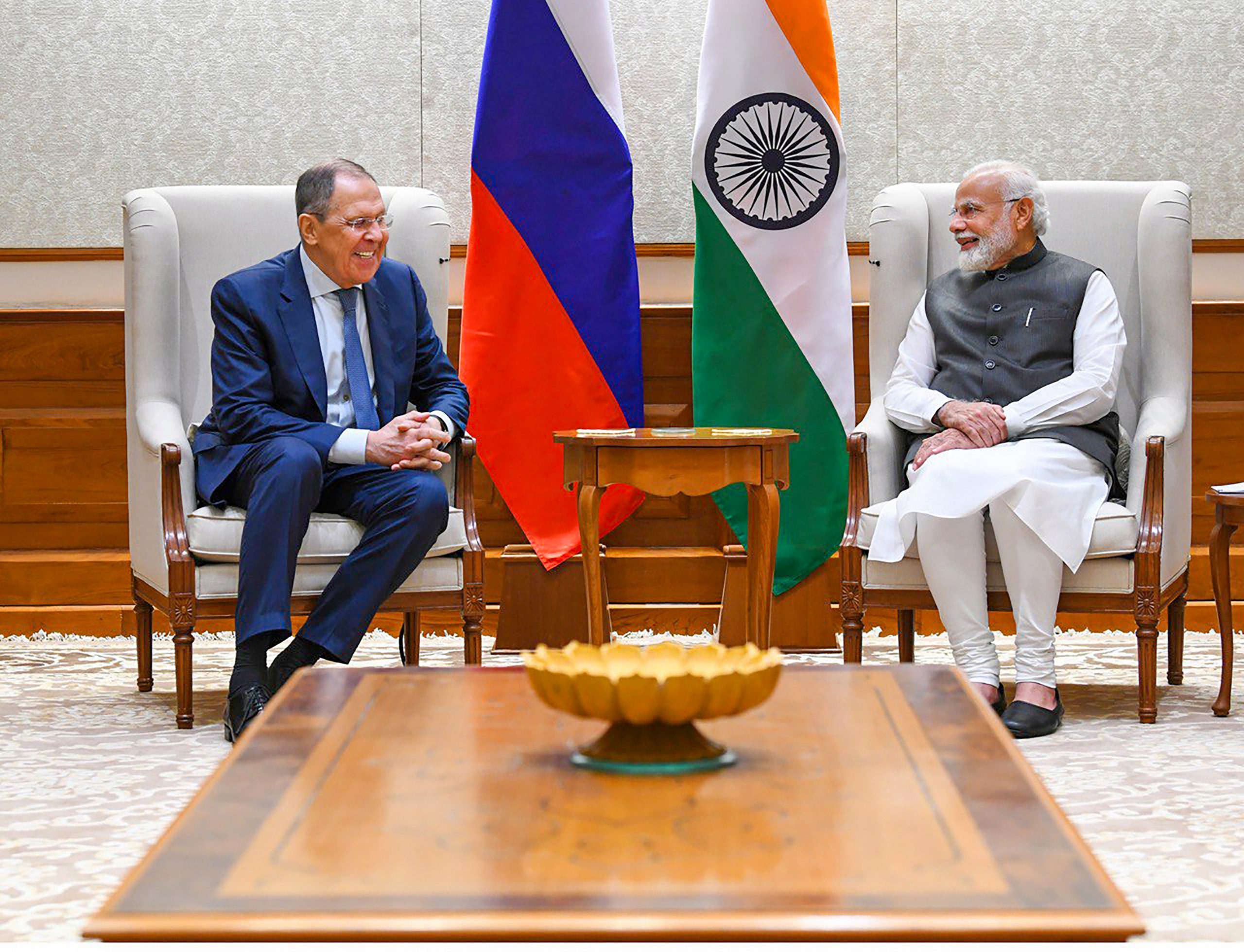Russian Foreign Minister Sergey Lavrov visited India, marking the highest level of diplomatic talks between the countries since President Vladimir Putin sent troops into Ukraine. In his meeting with Indian counterpart S Jaishankar, Lavrov discussed developing and using Russia-India-China’s trilateral mechanism better, to stabilize international relations, and ensure “equity in international affairs”.
Lavrov, who has only visited India, China, and Turkey, since the ‘special military operation’ in Ukraine started, said, “This is especially true given that all three countries – Russia, India and China – are now members of the UN Security Council. So we have a lot of plans”, Times of India reported. The Russian top diplomat was responding to a question of whether Moscow would be looking to Delhi and Beijing to fill the dip in its energy export.
Also Read | Russia aims Ukraine disinformation at Spanish speakers
Earlier this year, Russia had proposed a summit among the three nations. Lavrov added, “We are close partners with both countries. The three of us participate in a number of international formats… There is our “troika” – RIC (Russia, India, China)”.
Oil’s not well in Russia
Russia controls a large part of energy resources and many countries depend on the same. However, due to its actions in Ukraine, the US has taken the hardline stance of banning Russian oil imports, even bearing rising gas and oil prices in the nation. The UK is following suit and the European Union (EU) is also poised to phase out its reliance on Russian energy by the end of the year.
This, coupled with the EU’s refusal to pay Russia in rubles for oil, has left the sanction-hit nation in an economically fragile state.
Also Read | Retreating Russians leave many mines behind: Ukrainian President Volodymyr Zelensky
India, meanwhile, has been considering purchasing crude oil from Russia due to globally rising energy prices, which has left the nation looking for cheaper alternatives.
Part of Lavrov’s meeting with Delhi was to discuss India procuring Russian oil at a discounted rate while figuring out a rupee-ruble payment system that works for both countries.
The Chinese connection
China has been constantly supportive of Russia even after the latter sent troops to “denazify” and “demilitarize” Ukraine. While the rest of the world cried “invasion” and hit Russia with sanctions, China remained mum and urged that Russia’s security concerns were legitimate and should be addressed.
Not only did China refuse to impose sanctions on Russia, but also offered to buy their products to offset the impact of unilateral sanctions. China has also been critical of such sanctions, saying that they end up hurting the global economy. Reuters reported that China already relies on Russia for much of its oil and gas needs.
Also Read | Russia closed economy despite rouble rebound, headed for recession: US official
The two countries have reasserted their unity at the Beijing Olympics, where Putin met his Chinese counterpart Xi Jinping.
Thus far, at the United Nations, both China and India have abstained from voting against Russia, and both nations have urged a diplomatic solution to the crisis in Ukraine.
A messy triangle
Lavrov’s ‘troika’, however, might be difficult to achieve in light of current geopolitics.
China and Russia already share a close relationship, as highlighted above. India has been close to Moscow for a long time too, in fact, from before the fall of the Soviet Union.
With India discussing procuring energy from Russia, the country is cementing its place as even more greatly dependent on Moscow, since India also largely looks to the nation for its defence needs.
Also Read | UNESCO confirms at least 53 cultural heritage sites damaged in Ukraine
However, India faces a threat from China, as evidenced in the border skirmishes that took place starting May 5, 2020, near the Sikkim and the Tibet Autonomous Region border.
In fact, the threat from China has driven Delhi closer to Moscow, to bolster India’s military capacities.
Thus, it remains to be seen if Delhi can work closely with Beijing and Moscow, as per Lavrov’s desire, which found an echo in Chinese Foreign Minister Wang Yi’s visit to India, a few weeks back. After the meeting with China, the readout stated, as per TOI, that the two nations shared similar views on major regional and international issues, and called on both sides to lend energy for stability.







